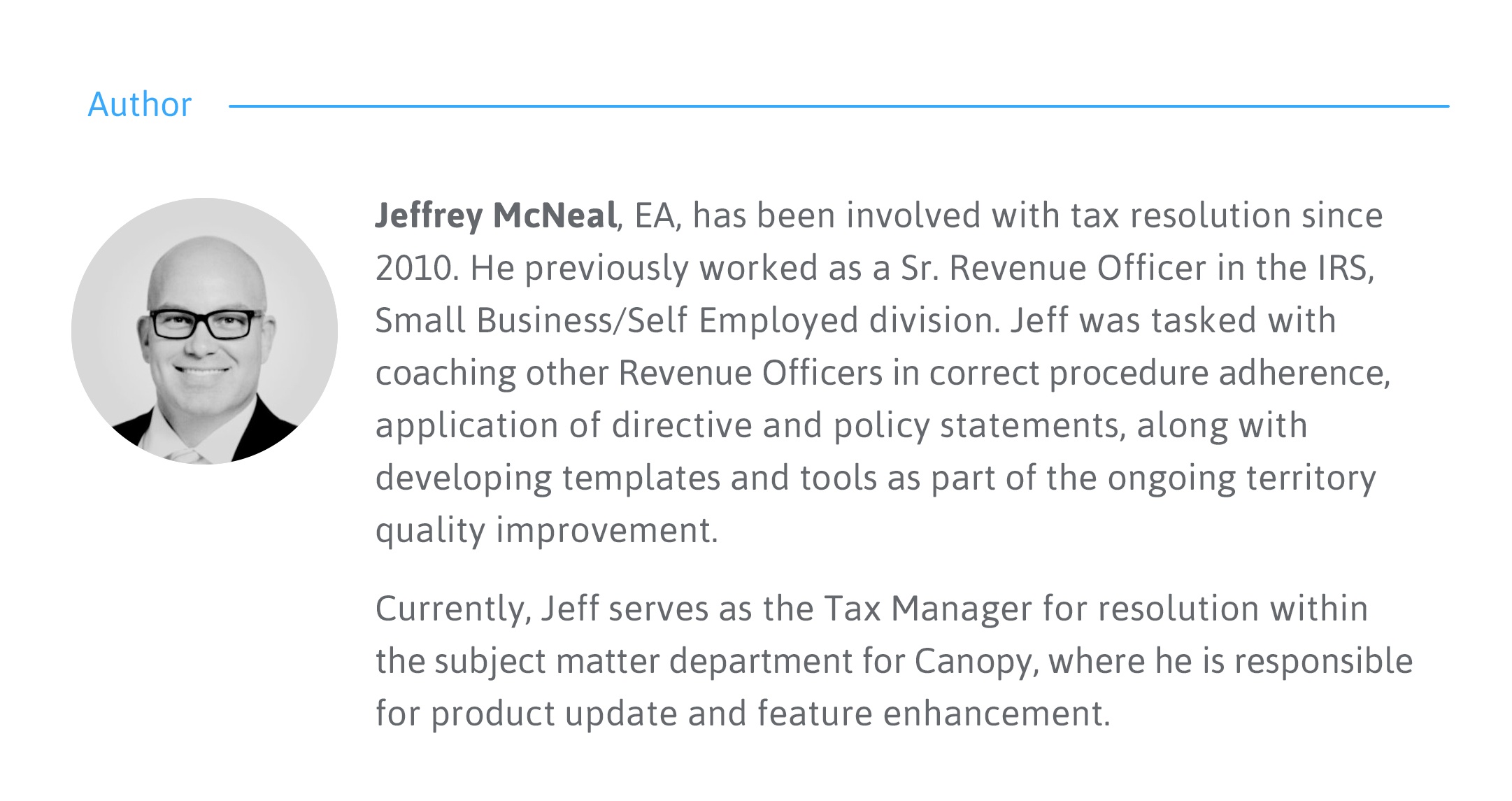Forty-one percent. That’s the percent of offers in compromise the IRS accepted in 2018. As a former Senior Revenue Officer I can tell you that those acceptances weren’t based on quotas or luck—they were based on real, compelling facts and evidence that were presented in those cases. If you know the hard and fast rules of Offer in Compromise and become familiar with the IRM, you’ll have a higher likelihood of getting offers accepted for your clients.
This post is the first installment of a 5-part blog series where I'll discuss some technical information you need to know when working on Offer in Compromise cases, but I'll also share some insights from my time with the IRS. I hope you’ll find it helpful in increasing your acceptance rate. In this first post we’ll take a look at the basics of Offer in Compromise and how to know if it’s a good option for your client.
What is Offer in Compromise?
An offer in compromise (OIC) is an option offered by the IRS that allows a taxpayer to settle their debt for less than what is actually owed. This option is great for a taxpayer because it gives them a fresh start with the IRS, but the ultimate goal of an offer in compromise is to come to a legal agreement for payment that’s in the best interest of both the taxpayer and the IRS.
The three grounds for submitting an offer in compromise are doubt as to collectibility, doubt as to liability, and effective tax administration. We’ll discuss these in more detail in later posts, but here are the basic definitions and differences:
- Doubt as to collectibility is when the taxpayer is unable to pay their full tax debt.
- Doubt as to liability is when the tax debt is assessed in error or the amount of debt assessed is incorrect.
- Effective tax administration is when the taxpayer is able to pay their debt but paying the full amount would either cause economic hardship or would be considered unfair because of exceptional circumstances.
Is Offer in Compromise right for your client?
The IRS created the Offer in Compromise program because many taxpayers cannot pay their tax liability without causing themselves financial hardship. In 2018 alone, the IRS accepted 24,000 offers, amounting to $261.3 million. That being said, they also rejected 35,000 offers. So how do you know if Offer in Compromise is right for your client?
In order to be successful with an offer in compromise, you must demonstrate that your client cannot pay the full tax debt owed, the tax is not actually owed, or another unique situation where an offer is in the best interest of all parties (see IRM 5.8.11.1). The IRS generally approves offers when the amount offered represents the most the IRS can expect to collect within a reasonable time period.
The first thing to look at when evaluating whether or not your client is a good fit for OIC is eligibility requirements. In order to be eligible for an offer in compromise, your client must:
- File all tax returns
- Have received a bill for at least one tax debt included on their offer
- Make all required estimated tax payments for the current year
- Make all required federal tax deposits for the current quarter (if they are a business owner with employees)
Beyond eligibility, the IRS will consider the following when determining financial hardship of your client:
- Ability to pay
- Income
- Expenses
- Asset equity
- Lifestyle
You can check out Form 433-A (OIC) for individuals or Form 433-B (OIC) for businesses to get a better idea of what information is reviewed in considering a client’s ability to pay.
Keep in mind, while certain qualifications and requirements are set in stone, the Revenue Officer reviewing your client’s case will look at the big picture of your client’s situation. The lifestyle of your client will play a huge factor in whether or not the officer recommends them for an OIC. For example, if you’re claiming that your client can’t pay their full tax debt but they drive a Range Rover and own a $2 million house, the officer won’t see them as a good candidate. Ultimately, the IRS doesn’t fund lifestyles, they collect taxes.
The majority of information about a client’s lifestyle is reflected on Form 433-A, but the rest of the information is gathered through investigation. If you are able to justify that your client is living a high-end lifestyle due to special circumstances, the officer will take that into consideration (this would fall under effective tax administration). Just because your client has equity in their house or vehicle doesn’t necessarily mean the IRS expects them to sell those things to pay their debt. However, overall, if your client is living a high-end lifestyle and wants to make lifestyle adjustments more gradually (rather than abruptly with Offer in Compromise), you may want to look into installment agreements and pay particular attention to the Six-Year Rule in combination with the One-Year Rule (IRM 5.14.1.4.1). This is not to say that if your client can afford to pay their tax debt but is willing to take a lifestyle hit that they will automatically qualify for OIC. To qualify they still must meet all the requirements.
One final thought to keep in mind in regard to your client’s ability to pay: while an offer in compromise is pending (which can be for several months), your client’s income and assets will be under ongoing review to make sure that at no point they become able to pay their tax debt.
Who will not qualify for Offer in Compromise?
Many of your clients will want to try for an offer in compromise because it’s one of the only options that can significantly decrease the amount of debt they owe. However, not everyone is eligible, even if they have a large amount of debt. The IRS will not accept an offer in compromise for a taxpayer who:
- Has unfiled tax returns
- Has a history of not paying their taxes
- Has deliberately avoided tax payment
- Is a tax protestor
- Is in an open bankruptcy proceeding (or has a business in an open bankruptcy proceeding)
- Has had their tax liabilities in question referred to the Department of Justice
As of March 2017, the IRS immediately returns any Offer in Compromise applications from taxpayers with outstanding returns.
Additionally, the IRS will generally not accept offers from a taxpayer who can pay their debt in full or through an installment agreement.
Check out my second post where I discuss two real doubt as to collectibility cases I worked on that got flagged.
Disclaimer: The opinions of Jeffrey McNeal are his own and in no way reflect Canopy or the IRS.







Get Our Latest Updates and News by Subscribing.
Join our email list for offers, and industry leading articles and content.